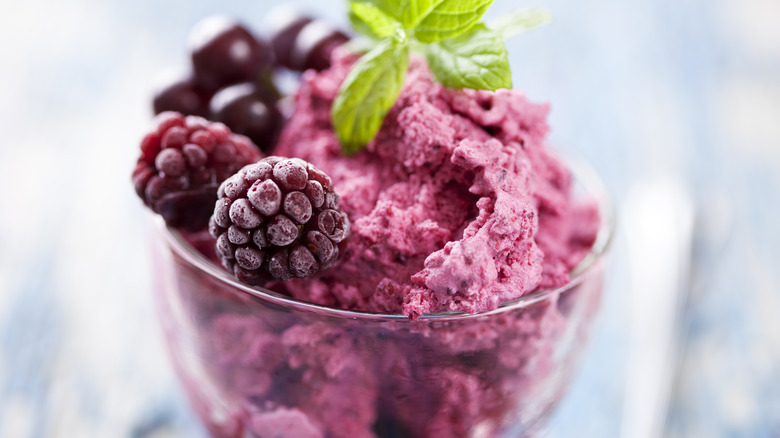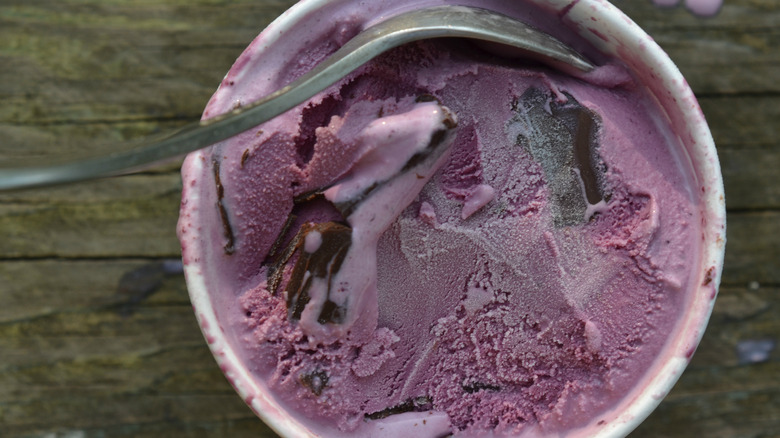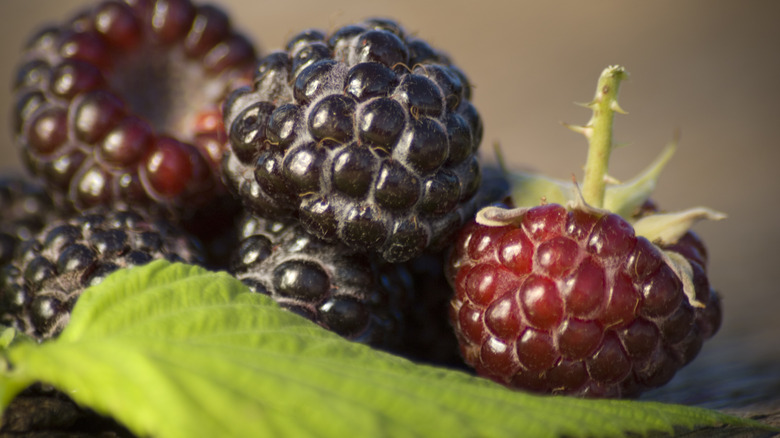What Are The Main Flavors In Purple Cow Ice Cream?
A New England favorite that has long since worked its way into other areas, "purple cow ice cream" is, at the end of the day, a combination of black raspberry ice cream and chocolate. How exactly it comes together depends on where you get it.
At Bart's in Greenfield, Massachusetts and Little Man in Denver, Colorado, it's black raspberry ice cream with white chocolate and dark chocolate chunks. At Acushnet Creamery in Acushnet, Massachusetts, it's black raspberry ice cream with Oreos mixed in. At Neighbor's Ice Cream in Port Orange, Florida, it's black raspberry ice cream with pieces of white chocolate hard shell. At Cayuga Lake Creamery in Ithaca, New York, it's black raspberry ice cream with chocolate chunks. Back in 2012, Friendly's released a purple cow flavor that combined mixed berry (strawberry, blueberry, and raspberry) ice cream with chocolate "flavored" chunks, but the company has since changed the name to Purple Potamus.
Black raspberry and chocolate is a classic combination. It's certainly not limited to New England — but it's also not often called "purple cow." Most often, you'll find an ice cream that meets the criteria but that's not branded as adorably, called simply "black raspberry chocolate chip/chunk," such as Graeter's (which happens to be Bobby Flay's favorite ice cream).
Not that Purple Cow
If you're confused because you know that there are many flavors of Purple Cow, you might shop at Meijer Grocery. Meijer's in-house brand of ice cream is also called Purple Cow and has been since 1934. That Purple Cow has more than 40 different flavors, including Midnight Black Raspberry (a purple cow with blackberry swirls).
Or maybe you've been to Lawrenceville, New Jersey. That Purple Cow was a small, family-run business for 12 years. They sold purple cow at that Purple Cow. There's another Purple Cow ice creamery in Lewisburg, Pennsylvania. And another in Pawtucket, Rhode Island. And one in Nepean, Ontario, as well as one in Alberta. The Bank Street Creamery in Easton, Pennsylvania was formerly The Purple Cow. And another in Waynesboro, Virginia, and Waubay, South Dakota, and likely many others. If you've been to the Evergreen State Fair in Washington, you may have been told by Carrie Neff of the Dairy Women that it's the only place you can get a Purple Cow — and to her credit, it is different and may be the only one of its kind: a float of blackberry ice cream, blackberry syrup, and 7-Up or Sprite.
Many of the Purple Cows, including Meijer's and the Evergreen Fair float, attribute their names to the short poem by Gelett Burgess from 1895: "I never saw a Purple Cow / I never hope to see one / But I can tell you anyhow / I would rather see than be one."
What are black raspberries?
Black raspberries come in three varieties: Eastern black raspberries, scientific name Rubus Occidentalis; Western black raspberries, also known as blackcaps, scientific name Rubus Leucodermis; and Korean black raspberries, scientific name Rubus Coreanus. All are closely related to red raspberries and blackberries. They grow wild all around North America (and, of course, Korea) in forests and meadows. Commercially, they're primarily farmed in Oregon.
Black raspberries are said to be stronger-flavored than red raspberries. They have high levels of the antioxidant anthocyanin, more than twice that of blackberries, leading to the strong purple color in purple cow ice cream (fun fact — for many years, the USDA stamp on meat was actually produced from black raspberry dye). Black raspberries can be distinguished from blackberries by the fleshy core that may or may not be found inside, called the "receptacle." Blackberries have them, but black raspberries do not and are hollow.


